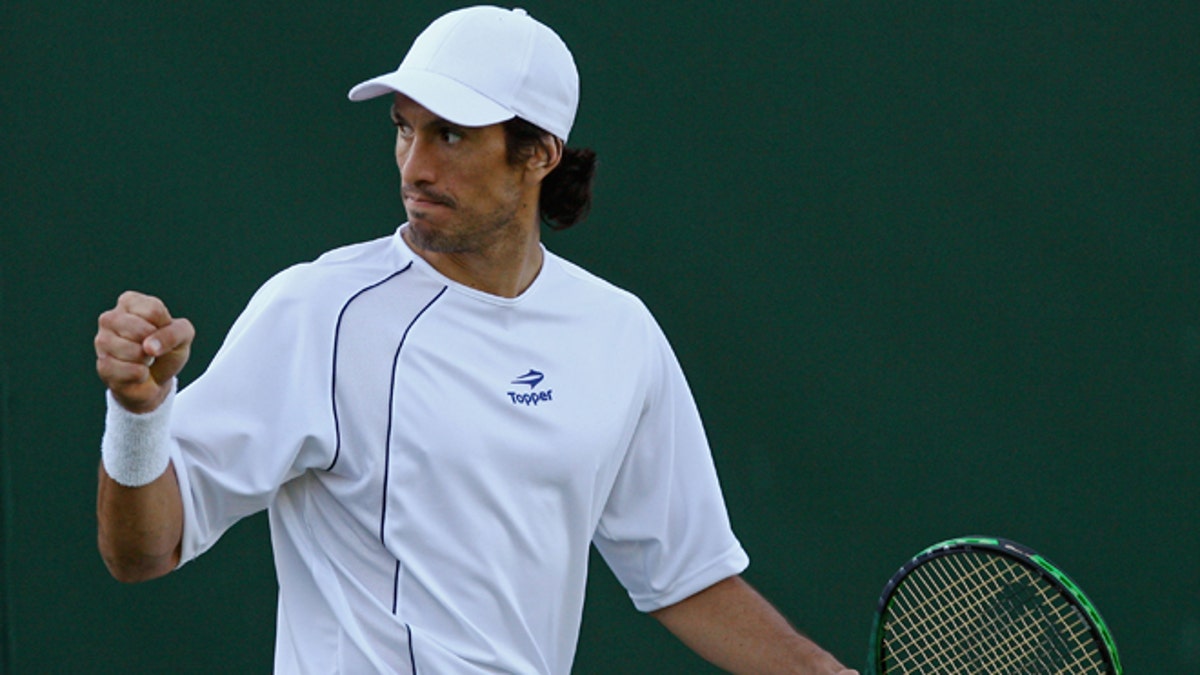
Martin Vassallo Arguello of Argentina, on June 23, 2009 in London, England. (2009 Getty Images)
The match-fixing scandal threatening to shake the world of tennis and tarnish the reputation of dozens of professionals started to grow roots more than 15 years ago, in a match that flew under even the most ardent fan’s radar.
It was a match from the second-round of the Orange Prokom tournament in Sopot, Poland, on Aug. 2, 2007.
That day the No. 4 ranked player at the time, the Russian Nikolay Davydenko, faced off against Martín Vassallo Argüello, an Argentinian player who was ranked No. 87 and today, at age 35, has a 47-81 career singles record.
According to the BBC, just before the match a large number of bets were placed against Davydenko at London’s Betfair gambling exchange. Just under $7 million was waged on Vassallo Argüello to win, a figure believed to be a whopping 10 times larger than the usual amount bet in matches of similar importance. Enough that people at the exchange took notice and forwarded the information to the Association of Tennis Professionals (ATP).
In the second set, Dvaydenko began receiving medical treatment for foot and ankle pain and losing a lot of points. He ended up losing the set and eventually retired in the third game of the third set.
Betfair voided all bets on the match, and the ATP gathered a group of investigators to look into the matter.
After more than a decade of silence, the scandal broke Monday when the BBC and BuzzFeed News published reports alleging that tennis authorities have repeatedly ignored widespread evidence of match-fixing. They say the accusation involves dozens of players, 16 of which who have ranked in the top 50 over the past decade.
BuzzFeed titled its story, "The Tennis Racket," and said that half of those 16, including a Grand Slam winner, were at this year's Australian Open.
Back in ’07, the team of investigators unsuccessfully tried to get Davydenko’s phone, but they did manage to get their hands on Vassallo Argüello's. They found a number marked "Davydenko", suggesting the players might have been in contact, but couldn't prove it.
Mark Phillips, one of the members of the team who looked into the Davydenko-Vassallo match, said, "In almost 20 years of working in the betting industry ... I have never seen a match or a race at such unrealistic odds," according to the BBC.
The ATP determined that there wasn’t enough evidence to sanction the players and kept the investigator’s report under wraps until it was leaked to the press earlier this week.
Around the world, players, commentators and fans are calling for clarity, saying the public and players have a right to know who is suspected of cheating.
Roger Federer said that he wants the names of the players involved to be released, while Martina Navratilova, the 18-time Grand Slam champion, tweeted on Wednesday: "We need facts, not suppositions."
"I would love to hear names," Federer said. "Then at least it's concrete stuff and you can actually debate about it. Was it the player? Was it the support team? Who was it? Was it before? Was it a doubles player, a singles player? Which Slam?"
"It's super serious and it's super important to maintain the integrity of our sport," Federer added. "So how high up does it go? The higher it goes, the more surprised I would be."
The Tennis Integrity Unit chief Nigel Willerton declined to say whether any players at the Australian Open were being monitored for suspected match-fixing.
Top-ranked Novak Djokovic said he doubted the problem extended to the top level of the sport, and pointed to the enhanced monitoring systems put in place.
"We have, I think, a sport (that has) evolved and upgraded our programs and authorities to deal with these particular cases," he said. "There's no real proof or evidence yet of any active players (being involved in match-fixing), for that matter. As long as it's like that, it's just speculation."
The Associated Press contributed to this report.








































